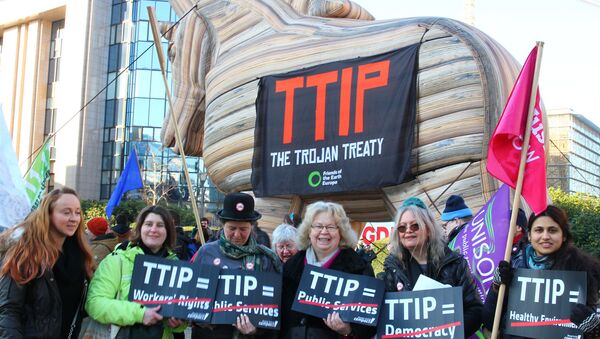Boris Johnson – who is now a leading campaigner to take the UK out of the EU at the In-Out referendum on Britain's membership of the EU on June 23 – had previously been in favor of the Transatlantic Trade and Investment Partnership (TTIP), currently being negotiated between the EU and the US.
Writing in the Daily Telegraph in 2014, Johnson said: "It is Churchillian in that it builds transatlantic links, it is all about free trade, and it brings Britain and Europe closer to America. The idea is to create a gigantic free-trade zone between the EU and the US … There is absolutely nothing not to like about the TTIP."
However, having declared himself behind the Brexit campaign, Johnson is now accused of making a U-turn after saying in a recent speech: "As for the argument that we need the muscle of EU membership if we are to do trade deals – well, as I say, at the results after 42 years of membership, the EU has done trade deals with the Palestinian Authority and San Marino. Bravo.
"But it has failed to conclude agreements with India, China or even America. Why? Because negotiating on behalf of the EU is like trying to ride a vast pantomime horse, with 28 people blindly pulling in different directions."
"Dishonest Gymnastics"
Johnson's reference to the late Sir Winston Churchill brought immediate condemnation from the grandson of the former UK Prime Minister, Sir Nicholas Soames who told The Observer newspaper:
"It is another example of Boris's complete lack of credibility and coherence on this very important transaction. People will simply not understand this fundamentally dishonest gymnastics.
"What he's attacking is the fact that the vested interests of member countries prevent any progress towards a TTIP deal. If the UK votes to leave the EU, we can do our own trade deal with the US free from member state interference."
The TTIP negotiations will lead to the biggest trade deal in the world, opening up the EU and the US to each other's markets.
There is also criticism over the Investor State Dispute Settlement (ISDS) under which companies are able to effectively sue governments if their regulatory system leads to lost profits.
A typical example of this is the cigarette giant Phillip Morris, which has attempted (unsuccessfully) to sue the Australian Government over plain cigarette packaging, but is still bringing a case against Uruguay over its anti-smoking legislation, which the tobacco giant says devalues its brands.



